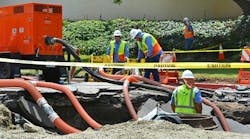In the face of an ongoing economic crisis, the Obama administration has offered citizens a financial and employment boost via the American Recovery and Reinvestment Act.
More than $130 billion in stimulus funding is earmarked for construction-related purposes, and the spending has helped slow the consistent 117,000-jobs-lost-per-month trend that the industry observed in the first half of 2009.
Do not mistake contributions to infrastructure projects, however, as a free pass; the U.S. Environmental Protection Agency (EPA) and other government-affiliated inspection and enforcement groups will not turn a blind eye to storm water management and erosion control violations on construction sites, regardless of their funding sources.
Even when working with a limited budget—and perhaps especially so due to the very real possibility of costly legal repercussions—project leaders must invest in compliance strategies prior to, during and after construction. Slope-stabilizing geosynthetics, sediment control barriers, inlet filters and the like are more important than ever.
Failure to apply for a permit, inadequate or absent storm water pollution prevention plans, improperly installed or maintained best management practices (BMPs) and insufficient inspections will land site managers in hot water. Under the Clean Water Act (CWA), the EPA can respond to these violations with varying degrees of enforcement actions.
In fact, amid news items announcing stimulus package allocations and project launches are those outlining the details of such regulatory infringements and their consequences. Recently, for example, the EPA fined an Idaho developer $12,900 for mismanaging runoff on a condominium development site and lacking a proper permit. Similarly, a Massachusetts construction company faces up to $157,000 in penalties for illegal discharges, poor BMPs and again, failure to apply for an appropriate permit. Across the nation, various project owners and supporting parties are finding themselves in comparable situations.
The bottom line: Sloppy work undertaken with little or no regard for the law and environment will not be tolerated. Rather than politely ignore what is required under the CWA and assume your work will slip under the radar, spare your project team and the environment potential complications by investing in compliance now.
Download: Here

